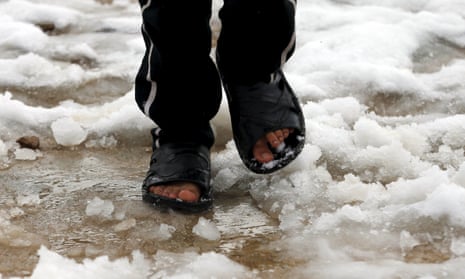The British government should demonstrate its commitment to helping the most vulnerable victims of the Syrian conflict by resettling 3,000 unaccompanied children in addition to the 20,000 refugees it has already agreed to take in, a group of MPs has suggested.
Although the international development committee (IDC) praises the government for the “exemplary standard” it has set other countries by allocating more than £1.1bn to tackle the crisis, it is urging the UK to accept Save the Children’s recommendation for an increase in the number of young refugees being offered resettlement.
In its report on the Syrian refugee crisis, published on Tuesday, the committee warns that unaccompanied young refugees risk falling victim to traffickers and finding themselves forced into prostitution, child labour or the drugs trade.
It says: “We would welcome a decision by the government in favour of resettling 3,000 unaccompanied children, as recommended by Save the Children, and in addition to the current commitment to resettle 20,000 refugees from the region.”
Stephen Twigg, the chair of the IDC, said the proposal offered the government another concrete way of helping some of those most affected by almost five years of civil war in Syria.
“We think the government needs to get on with it and make a decision,” he said. “By accepting the recommendations of Save the Children, the government would make a very powerful point about how seriously we as a country take the plight of the children, whether they are in Syria itself, the surrounding countries or those who have made the perilous journey to Europe.”
Given the huge numbers of refugees taken in by Turkey, Lebanon and Jordan, added Twigg, “I don’t think it’s a lot to ask to say in addition to the 20,000 the prime minister has pledged to resettle, we will also take 3,000 unaccompanied children from Europe”.
While the report praises the Department for International Development (DfID) for its commitment to tackling the largest humanitarian emergency since the second world war, it calls on the government to make sure that other rich nations follow suit.
It points to research by Oxfam that suggests that the UK is the only G7 country to have contributed its “fair share” of funding: “Whilst the UK has generously contributed 229% of its fair share, France, for example, has contributed 22%, Japan 24% and Italy 21%.”
The problem, according to the committee, is that unlike the UK and a handful of others, most wealthy countries have still not made good on the 46-year-old pledge to spend 0.7% of their gross national income on foreign aid.
With the global appeal for Syria for 2015 only 53% funded, the IDC says it is “deeply concerned about the lack of financial support from the UK’s partners, particularly European countries and members of the OECD Development Assistance Committee (DAC)”.
The report urges the government to make sure that “invisible” and vulnerable groups – such as LGBT, Christians and people with disabilities – get access to the resettlement programme, and to press the Lebanese government to allow the UN refugee agency (UNHCR) to resume the registration of Syrian refugees, which was suspended in May last year.
It also asks DfID to explore the best ways of supporting refugees and host communities by finding “sustainable employment solutions” that will help ease tension in countries such as Lebanon and Jordan.
Last month, the World Bank and the UNHCR called for a “paradigm shift” in the way the world responds to refugee crises such as the Syrian emergency, warning that the current approach is too short-term and is preventing poorer refugees from integrating economically into their host communities.
Save the Children welcomed what it termed the committee’s “urgent call”, adding that Britain had a proud history of helping child refugees.
“These children need and deserve our help and protection,” said the charity’s CEO, Justin Forsyth. “Save the Children helps by providing food, warm clothes and psychological care across Europe and the Middle East, but nothing can replace a safe and secure home.”
The government did not respond directly to the report’s key recommendation, but it is understood that it is still considering the possibility of resettling the 3,000 unaccompanied child refugees. Such children could be taken in from the Middle East region or from the EU – but only if the government is satisfied that it is in the children’s best interests and that they are not inadvertently put at risk.
A government spokesman said the report reflected the UK’s position “at the forefront” of the humanitarian response to the Syria crisis, and said that Britain would continue to push others to honour their commitments.
“Our programme in Syria has already resettled vulnerable children as part of family groups, with over 1,000 refugees resettled by Christmas [2015],” he said.
“Additionally, the UK government’s £1.1bn commitment is helping hundreds of thousands of the most vulnerable people in Syria and the region to rebuild their lives, and next month’s Syria conference in London will raise significant new funding from the international community.”
Since war broke out in Syria in March 2011, 7.6 million people have been internally displaced, almost 4.4 million forced to flee as refugees, and more than 250,000 killed. One in every five displaced persons worldwide in 2014 was Syrian.
